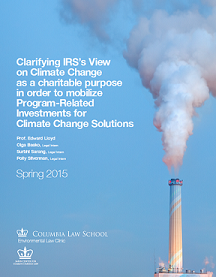 Mitigating climate change is going to require unlocking new sources of finance to fund the innovative technologies that will take us to a low-emissions future. Program related investments (PRIs), investments that support charitable activities while also offering the potential return of capital, are one vehicle that could help unlock these funds. However, a lack of clarity over whether potential PRIs would be eligible, and the imposition of a heavy penalty tax for getting it wrong, has made would-be investors hesitant and created barriers to their utilization.
Mitigating climate change is going to require unlocking new sources of finance to fund the innovative technologies that will take us to a low-emissions future. Program related investments (PRIs), investments that support charitable activities while also offering the potential return of capital, are one vehicle that could help unlock these funds. However, a lack of clarity over whether potential PRIs would be eligible, and the imposition of a heavy penalty tax for getting it wrong, has made would-be investors hesitant and created barriers to their utilization.
To resolve some of the uncertainty surrounding the use of PRIs for climate-related investments, the Columbia Environmental Law Clinic has just published a new report: Clarifying IRS’s View on Climate Change as a Charitable Purpose in order to Mobilize Program-Related Investments for Climate Change Solutions.
The report begins with an overview of the laws governing foundations and PRIs, and an explanation of how foundation-made PRIs can help fund new clean energy technology. It discusses the historical acceptable of environmental preservation and protection as a charitable purpose by the International Revenue Service (IRS), as well as the obstacles that organizations have come up against when seeking to have their environmental activities deemed a furtherance of charitable purpose. It focuses more broadly on environmental action as there are very few cases dealing explicitly with climate change.
The authors conclude that the law in this area is underdeveloped. There is no explicit mention of environmental protection in the statutes governing what is charitable. There are a few PRI decisions in which the IRS has stated that environmental preservation is a charitable purpose. However, the IRS often looks for additional factors to justify its conclusion that an environmental protection activity serves a charitable purpose. For example, such activities may be justified as charitable for “lessening the burdens of government” and “combating neighborhood deterioration.” When these factors are absent, it is harder to get the activity considered as charitable. The IRS has also required that the environmental benefits be sufficiently “direct” and “significant” in order to justify a PRI without clarifying what satisfies those conditions. Finally, when it comes to development of technology, there appears to be a fine line between the activities being charitable as opposed to too supportive of a commercial enterprise.




